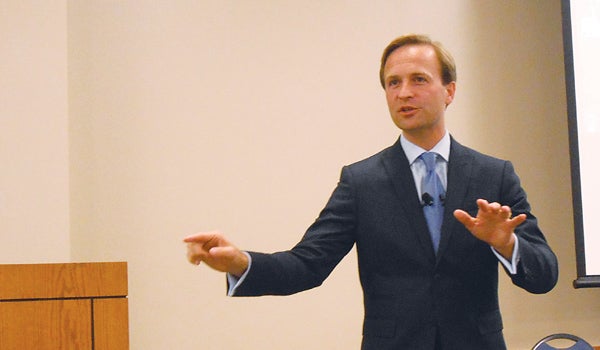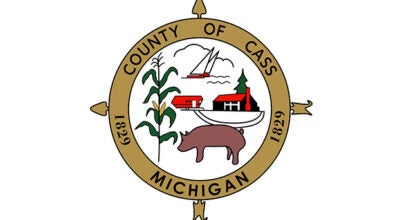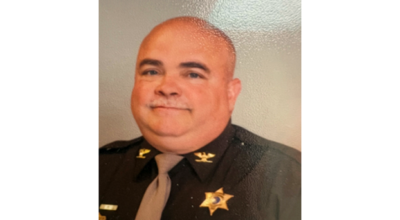Opioid Summit for Human Services provides new perspective on addiction
Published 7:46 am Tuesday, August 23, 2016

- Lt. Gov. Brian Calley addresses a crowd at Southwestern Michigan College on opioid addiction, Friday at the Opioid Summit for Human Services. (Leader photo/KELSEY HAMMON)
An addict struggling with prescription drug abuse cannot always find a way to beat addiction by themselves, but with the help of the community the cycle of drug abuse can be thwarted and overall costs to the community can be reduced.
The first step is addressing their addiction with the proper healthcare treatment, rather than just sending them to jail.
This was the resounding message from Michigan Lt. Gov. Brian Calley Friday at the Opioid Summit for Human Services.
Hundreds attended the summit at Southwestern Michigan College to listen to local leaders who have been battling the issue. The Cass County Prosecutor’s Office and CASS Community Coalition sponsored the summit. On the agenda was a discussion with Cass County Prosecutor Victor Fitz and Chief Judge Susan Dobrich. There was also a presentation of the neurological side of addiction with Doctor R. Corey Waller. Among the crowd were law enforcement officers and health care professionals.
Calley was elected Lt. Gov. in 2010. He is the chair of the Prescription Drug and Opioid Task Force and has been working to combat the issue that is on the rise in Cass County.
“If we can have a lens change, then I think it will make us more effective and actually solve the problems that lead to broken families and deaths and overdoses and thefts,” Calley said. “So how do we get there? “
Calley discussed several ideas that could potentially build a foundation to help combat the issue. Resources for prior actions have been maintained from several state partners, including the legislature.
“Normally we have a task force report like this that has recommendations. Some of them have a price tag. … Legislature took those resources from the very next budget and actually moved them up into a supplemental budget so that we could start some of the centerpiece work.”
Some recommendations for a stronger foundation to combat doctors prescribing opioids to addicts or former addicts is implementing a system that allows doctors to have records of a patient’s history with substances. Currently, there is the Michigan Automated Prescription Services, but Calley said the system does not quite work like it should, functioning on an old platform that isn’t user friendly and does not have a patient’s full history accessible and is in need of a revamp.
Calley also discussed the possibility of having an antidote available. Antidotes such as Narcan can be administered to someone overdosing and it will block and reverse the effects of overdose. Antidotes are easy to use, said Calley, and won’t hurt a person if administered when unnecessary.
“Recovery is not a straight line. When a person is trying to quit that is when they are most vulnerable to overdose,” Calley said.
He said this is because a person who is trying to quit may be successful for a period of time and then relapse and try to go back to the dose they used to be able to handle.
“Why not make it as easy as possible for the people that are right around them to save them?” Calley said.
Among the crowd was Marquita Lashley of Berrien Springs. Lashely, who works for Families Together Building Solutions she said that she liked how the summit focused on treating addicts as people with a healthcare issues rather than stigmatizing them as criminals. Lashley said they often deal with people who have struggled with drug abuse.
“I liked the focus on what can we do to help,” Lashley said. “I liked what I heard.”
Next to her at the same table, Sharon Spencer, who also works with Families Together Building Solutions, agreed that the summit was helpful. One thing she said she wished they had discussed more was how to help children who might be in a situation where their parents are users and finding resources for the how the family can move forward as a whole.
To Spencer, the most helpful information was the message that solutions are out there.
“(It’s good) to know that they are looking into the future and not actually criminalizing, because an addiction is a disease.”





